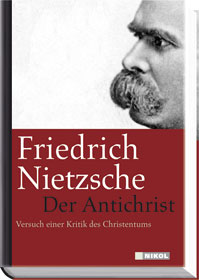
Christianity is called the religion of pity… Pity runs counter to the whole law of evolution, which is the law of selection. It preserves whatever is ripe for destruction; it fights on the side of those disinherited and condemned by life, and it gives a depressive and questionable character to life itself by keeping alive an abundance of failures of every type.
Category: Friedrich Nietzsche

I understand corruption (as I am sure you have guessed by now) in the sense of decadence: my claim is that all the values in which humanity has collected its highest desiderata are values of decadence.
I call an animal, a species, an individual corrupt when it loses its instincts, when it chooses, when it prefers things that will harm it…
Life itself appears to me as an instinct for growth, for survival, for the accumulation of forces, for power: whenever the will to power fails there is decline.
 You should not beautify Christianity or try to dress it up: it has waged a war to the death against this higher type of person, it has banned all the basic instincts of this type, it has developed its concept of evil, of the Evil One himself out of these instincts—the strong human being as reprehensible, as ‘depraved’.
You should not beautify Christianity or try to dress it up: it has waged a war to the death against this higher type of person, it has banned all the basic instincts of this type, it has developed its concept of evil, of the Evil One himself out of these instincts—the strong human being as reprehensible, as ‘depraved’.
Christianity has taken the side of everything weak, base, failed; it has made an ideal out of whatever contradicts the preservation instincts of sound life; it has corrupted even the faculties of those natures that are intellectually most vigorous by teaching people to see the highest spiritual values as sinful, as deceptive, as temptations. The most lamentable example—the corruption of Pascal, who believed that his intellect had been destroyed by original sin, whereas it was actually destroyed by Christianity! —
Or
Combating the ultimate meme: God
In the chapter ‘The Battleground of Demons’ Nixey wrote:
But however alarming the demons of fornication may have been, the most fearsome demons of all were to be found, teeming like flies on a corpse, around the traditional gods of the empire. Jupiter, Aphrodite, Bacchus and Isis; all of them, in the eyes of these Christian writers, were demonic.
In sermon after sermon, tract after tract, Christian preachers and writers reminded the faithful in violently disapproving language that the ‘error’ of the pagan religions was demonically inspired. It was demons who first put the ‘delusion’ of other religions into the minds of humans, these writers explained.
It was demons who had foisted the gods upon ‘the seduced and ensnared minds of human beings’. Everything about the old religions was demonic. As Augustine thundered: ‘All the pagans were under the power of demons. Temples were built to demons, altars were set up to demons, priests ordained for the service of demons, sacrifices offered to demons, and ecstatic ravers were brought in as prophets for demons.’
Let’s return the favour.
The worst mistake that the white race has made is to have drunk the hemlock of the Bible. The Torah may be good for the Jews insofar as it teaches them ethnocentrism for the Hebrews and the genocide of the gentiles. But the Gospel is fatal to whites insofar as it teaches them to indiscriminately love the Other. The Torah added to the Gospel results in the Biblical United States and in Neochristian Europe. The suicidal standards of values of the philo-Semitic US and the secular EU are exactly the same.
In order to break the spell of the axiological hypnosis of the West, we must comply with the sixth article of the ‘Law against Christianity’ by Nietzsche:
§ 6 — The ‘holy’ history should be called by the name it deserves, the cursed history; the words ‘God’, ‘saviour’, ‘redeemer’, ‘saint’ should be used as terms of abuse, to signify criminals.
This initiative of mine, taking Nietzsche’s law seriously as payback for what the Xtians did (cf. Nixey’s quote above), reminds me of something I read in Siege. James Mason said there was a quantum leap from what Rockwell preached—the well-meaning but mistaken commander who placed the Nazi flag side by side the American flag—and the revolutionary proposal. But while Mason realised that the American government must be overthrown through armed revolution, he did not depart from the religion of those who precisely form the American government.
The real breakthrough in my opinion lies in rebelling against the ultimate meme: the idea of God. And that can only be done with a counter-meme: using the word ‘God’ as an insult, as it is obvious that for the Western mentality ‘God’ means nothing else than the god of the Jews.
I came to these conclusions after reading the recent transcript of the first podcast of this site, ‘Christianity is White Genocide’. More than what Linder said I liked what Walsh said. But even in what he said, that it was unclear if God existed, there is a residue of the brainwashing, as it is obvious that the god of the Jews doesn’t exist.
That same residue persisted in the philosophes of the Enlightenment. Not being Jew-wise, d’Alembert, Diderot, Hume, Kant, Montesquieu, Rousseau, Condorcet, Voltaire, Benjamin Franklin and others did not understand the psyop that monotheism represented for Europe. Some of them even transformed the god of the Jews into the nebulous god of the deists but never dared to insult the very idea of ‘God’.
Had the so-called Enlightenment understood the ultimate meme, which reminds me of what Heisman✡ said in some of the twelve entries I recently devoted to his book, they would have developed the sixth article of Nietzsche’s law ever since:
§ 6 — The ‘holy’ history should be called by the name it deserves, the cursed history; the words ‘God’, ‘saviour’, ‘redeemer’, ‘saint’ should be used as terms of abuse, to signify criminals.
Anti-Christian German Nazis and William Pierce are dead. It seems sad to me that no one has taken Pierce’s torch in North America at the moment. Or maybe I’m wrong. From the strictly geographical point of view I am in North America. But it is still sad that no native English speaker has realised that they have to fight the ultimate meme of the Jews, the haughty idea of ‘God’, monotheism: that the god of the Jews is the only god that exists.
Friedrich Nietzsche claimed that modern morality and modern democratic, egalitarian ideas are superficial secularizations of Christian values. His masterful philosophical and psychological analysis of Jesus and his movement is the starting point of any significant discussion about Christianity’s relationship to modern values. Christianity, he claimed, was a slave morality, and modern egalitarianism rests upon the underlying victory of value revolution Christianity initiated.
Yet the secularization thesis is not an exclusively elitist insight. As popular historian Thomas Cahill put it in The Gift of the Jews, “There is no way that it could ever have been ‘self-evident that all men are created equal’ without the intervention of the Jews.” No matter which way one looks at it, whether elitist or populist, Jews, including Jesus, have been decisive in molding the evolution of civilization in the West through the inordinate influence of Christianity.
Contra Nietzsche, evolutionary biologist Richard Dawkins, in The God Delusion, takes the diametrically opposite view that “modern” morality does not come from the Bible. One of the greatest failures of Dawkins’ book is that he fails to even mention Nietzsche; he fails to mention the most relevant and potent challenge to his belief that the morality of modernity has nothing to do with the Bible. Among the reasons that Dawkins did not confront Nietzsche, perhaps this is the most obvious: if Nietzsche is right, Dawkins is wrong…
Dawkins believes in an ever-moving Zeitgeist. This spirit of the times is a spirit of progress that moves away from prejudices such as racism, sexism, and homophobia, and towards some form of political equality. This politically leftwards shift, he claims, has no connection with religion; it even marches on despite religion. But if modern egalitarianism does not come from the Bible, then where does it come from? Dawkins explained:
The onus is not on me to answer. For my purpose it is sufficient that they certainly have not come from religion.
That is an explanation? How can religion be ruled out if he has no substantial alternative explanation? While his atheism is a lack of belief in God or gods, he is unable to offer a positive scientific explanation for the modern Western values he has faith in. Dawkins accepted the premise that morality is ‘not necessarily constructed by reason’. But if reason cannot determine fundamental values, then liberalism and the mysterious modern Zeitgeist of progress rest on fundamentally irrational foundations.
 Dawkins apparently believes in a spontaneous generation or special creation theory of modern values. In the special creation theory of modern political equality, Christianity has nothing to do with its quick and sudden evolution. “Progress” thus progresses from a spontaneous generation of modern egalitarian values. Dawkins writes almost as if modernity did not evolve out of the Christian world that preceded it…
Dawkins apparently believes in a spontaneous generation or special creation theory of modern values. In the special creation theory of modern political equality, Christianity has nothing to do with its quick and sudden evolution. “Progress” thus progresses from a spontaneous generation of modern egalitarian values. Dawkins writes almost as if modernity did not evolve out of the Christian world that preceded it…
Jesus turned the ancient world upside down. Either Roman/Jewish war would tear him apart, or Jesus would tear Roman/Jewish war apart by attacking the kin selective nepotism that polarized both Roman and Jew in opposition to Jesus himself. Jesus reversed kin selective values through hatred of the family. Dawkins apparently prefers the Old Testament on this point, and criticized Jesus for his “dodgy family values.” But if Dawkins is going to criticize Jesus’s anti-kin selective values, he should really criticize the values of modernity. What “modern moralist”, Dawkins asked, would follow Abraham? Yet Abraham’s willingness to kill his own son in the name of God is a theological root of Jesus’s hatred of the family. God was not to be confused with pure family values…
To reverse kin selection is to destroy the human family. This is how Jesus attempted to bring the world-rule of the selfish gene to an end. In standing as an individual against kin selective, Jesus acted as the supreme monkeywrench in the gene machine that undergirded modern individualism.
Dawkins hypothesized that indiscriminate altruism in the modern context, along with sex with contraception, are misfirings of former genetic adaptations. Since Dawkins subscribes to some form of the liberal egalitarian Zeitgeist, this means that Dawkins values this misfiring of ancient genetic adaptations. Dawkins thus believes that these forms of genetically maladaptive behavior are good. Why does Dawkins value genetically maladaptive behavior?
Jesus represented a social problem and his innovative ethics represent, in a sense, a kind of solution. Jesus’s ethics are fundamentally selfish in the sense that, in attacking kin selective altruism with an incompatible standard of anti-kin selective altruism, he opened a place for the half-breeds… Christianity, an antidote to genetically adaptive hatred, is probably the deepest source of the implicit modern valuation that the nepotism of kin selection (i.e. Christ killing Nazi racism) is evil.
Jesus was a mutt, but not just any kind of mutt. Jews and Romans were considered political opposite—and often spiritual opposites. Romans considered themselves the alphas of their world, and the Jews the omegas of their world. Jews considered themselves alphas in the eyes of God, and the Romans as the moral omegas of their world. Jesus combined these incompatible alpha/omega conflicts within himself. Jesus could be conceived as both the alpha and the omega his social order. All previous “social” boundaries were broken in his individual being. His very existence implicated the breaking of all social boundaries. All the seeds of modernity, as a break with the ancient world, are latent within the existence of Jesus…
Being a bridge of the gulf between gentile and Jew in life, Jesus was a bridge of the gulf between gentile and Jew in death. Gentile assimilation of Christianity over a thousand medieval years gradually engendered the modern idea of humanity. The assimilation of Jew and gentile in Jesus is what opened assimilation of Jew and gentile in the modern West.
If reason, in itself, cannot determine fundamental values, it becomes clearer that Christianity provided the ethical ends, while modernity bridged the chasm between the real and ideal by providing the technological means to realize those ethical ends. Modernity was bred out of a struggle between the real and the ideal in the form of a struggle for moral superiority…
The path towards self-destruction through moral superiority can be discerned in Matthew 5:38-39:
You have heard that it was said, ‘Eye for eye, and tooth for tooth.’ But I tell you, Do not resist an evil person. If someone strikes you on the right cheek, turn to him the other also.
When Jesus say “But I tell you”, he is upping the ante above Judaism’s upping the ante above paganism.
Non-violent resistance is not a modern invention; it was practiced by first-century Jews against Rome. Jesus’s political powerlessness, however, became the limitation that grounded his theological innovations. Jesus’s innovations with Judaism mirrored the origins of Judaism itself in paradigmatic Egyptian slaves. The less powerful one is, the higher one’s ethic may be—at least in principle. Christianity is more evolved than Judaism in that it has even lower or more forgiving standards of what a good human being is than Judaism…
Jesus’s death as a gene propagator, and resurrection as a meme propagator, can be understood as a supernatural defiance of the “natural law” of natural selection. Bodily death was not the final word.
The sanctification of human life in opposition to natural selection was Biblically expressed through the notion of the human soul, and especially mind/body dualism…
Modern liberalism has not been inclined to acknowledge its historical debt to Christianity anymore than Christianity has been historically inclined to acknowledge its Jewish parentage. Yet one cannot fully understand the secularization of Christianity except as a development with roots in the preceding paradigm of Christianity’s separation from Judaism.
When rootless West moderns trace their roots to Christianity, they are led to Christianity’s roots in Judaism (this is surely a formula for rootlessness).
[pages 488-500]
Judaism for the Gentiles?
When Christian social conservatives reach for their cultural roots, they embrace the uprooting force of Christianity. Christianity began a long process of uprooting gentiles from their pagan past. Monotheism substituted an alternate past and an alternate view of themselves as heirs of Hebrew ancestors. In some sense, Christianity brought non-Jews to serve in what was originally a Jewish mission. Has Christianity molded Christians in a Jewish moral image?
In The Anti-Christ, Nietzsche declared:
Jews are the most catastrophic people of world history: by their aftereffect they have made mankind so thoroughly false that even today the Christian can feel anti-Jewish without realizing that he himself is the ultimate Jewish consequence.
Christian antisemitism is a kind of Jewish self-hatred. In worshipping a Jew named Jesus as their God, and dedicating themselves to essential Jewish values, Christians have dedicated themselves to a form of Judaism.
Because Jesus’s preaching of hatred for the family must be subverted in order for Christianity to function as a normative, societal religion, there must be cases where the ambiguity between the alpha altruism and omega altruism becomes so obscured and perverted that Christianity becomes a vehicle of racism.
Take, for example, white American Christian racists. They hate blacks. They hate Mexicans. They hate Jews. And, incidentally, they worship a Jew as the son of God. It is only natural that such Christian racists should pray to Jesus to save them from the Jews.
The fact that modern Christians tend to be associated with the conservative values of the family is a product of Christianity as a societal tradition, not Christianity as an implementation of the words of Jesus. What would happen if a Christian took Jesus’s message seriously? The Danish philosopher Soren Kierkegaard, in Attack Upon “Christendom”, wrote:
And this in my opinion is the falsification of which official Christianity is guilty: it does not frankly and unreservedly make known the Christian requirement—perhaps because it is afraid people would shudder to see at what a distance from it we are living… when Christ requires us to save our life eternally (and that surely is what we propose to attain as Christians) and to hate our own life in this world, is there then a single one among us whose life in the remotest degree could be called even the weakest effort in this direction?… let us not wish to gloss over the Christian requirement, so that by suppression or by falsification we may bring about an appearance of decorum which is in the very highest degree demoralizing and is a sly death-blow to Christianity.
American politician Patrick Buchanan, by contrast, has attempted to resurrect Jesus just enough to achieve his racist, politically Darwinistic goals. It would appear that the conventional Christian virtue Buchanan admires most is hypocrisy. He laments the loss of the good old-fashioned Christian hypocrisy in which a thinly veiled pagan morality edified the slaughter of a Christian’s fellow men under the banner of Christian love.
 If Buchanan were to examine himself with Kierkegaard’s eye, it might dawn upon him that he is attacking the Christian churches for being Christian: “We were wrong to accompany the old conquistadors, wrong to impose our faith on native peoples, wrong to be handmaidens of empire. We confess, we beg forgiveness from those against whom we and our fathers have sinned.” He then points out, “Now this may be the way to heaven, but it can lead to hell on earth.” Buchanan and other likeminded Christian racists made it their mission to ensure that the meek do not inherit the earth.
If Buchanan were to examine himself with Kierkegaard’s eye, it might dawn upon him that he is attacking the Christian churches for being Christian: “We were wrong to accompany the old conquistadors, wrong to impose our faith on native peoples, wrong to be handmaidens of empire. We confess, we beg forgiveness from those against whom we and our fathers have sinned.” He then points out, “Now this may be the way to heaven, but it can lead to hell on earth.” Buchanan and other likeminded Christian racists made it their mission to ensure that the meek do not inherit the earth.
Much of what Christian conservatives are trying to conserve is actually pagan, not Christian. Christianity did not invent the family. Christianity became guilty by association with that kind of social conservatism.
An authentic Christian conservatism would amount to the conservation of the subversion of family patriarchy. Christianity fundamentally redefined the horizons of what became “conservatism”, closing the extreme horizons of the gentile political right represented by Rome, and thus pushing normative Christian ethical horizons towards Jewish norms. A real conservative can be witnessed in the Roman emperor Julian the Apostate (c. 331-363 AD), the enemy of Christianity who converted to the paganism of his ancestors in 361.
Every single accusation of the defamation and dethroning of gods and heroes that Buchanan hurls at secular leftists can be slinged with more profound justice at Christianity. Buchanan himself portends what he calls the “death of the West” precisely because the solution he posits is Christian. His solution to the “problem” is the cause of the “problem”. What Buchanan criticizes is ultimately rooted in Christianity’s spiritual revolution over Rome.
Christianity inspired gentiles to deracinate themselves from their original pagan gods, naturalistic values, and ancestral traditions. Liberalism continues this deracination. The political left casts out those final surviving remains of politically pagan sentiment in the name of radicalism almost akin to Jesus’s attack on normative Pharisaic Judaism.
Christianity decontextualized and recontextualized patriarchy and altruism, subverting the pre-Christian assumptions and social conditions they evolved and originated in. Jesus’s influence effected a softening of the kinship core of patriarchy. From this softened core, liberal social dismantling took administrative control over the hypocrisy industry that Christianity launched. Pat Buchanan himself demonstrates the great reaping of what Christianity has sown: neutralization. Buchanan’s racist cause was effectively neutralized by the victory of Christianity’s melting of racism’s kinship core.
Christianity disempowers and disenfranchises kinship relations. It does this by radicalizing the logic of altruism beyond its sociobiological foundation in kinship, subversively making kinship appear inferior in comparison with its higher, more “universalistic” concerns. In secularized terms, this makes kin selective values, which can include racist values, appear inferior in value.
The Christian moral attack against hereditary social relations is at the root of the modern Western social project of systematic kin selective insanity, i.e. the modern idea of leftward social progress. It was liberalism’s Christian inheritance that made a virtue of kin selective insanity. Genetic self-preservation is immorality when genetic suicide is morality. To literally follow Jesus’s example is to follow the example of celibate priests and implement the extinction of the biological human race.
Mixed marriages between Christianity and racism persist nonetheless. Perhaps the most famous product of the union of Christianity and racism is the bastard child known as the Ku Klux Klan. Caught between white supremacism and Christ supremacism, the Ku Klux Klan has solved the problem of incompatible ethical commitments through a hybrid creed that offers the worst of both worlds. Their greatest feat of all has been to corrupt both the Christianity that they profess to believe in and their own racist cause in one stumbling stroke.

The problem I am posing is not what shall replace humanity in the order of living creatures (—the human is an endpoint—): but instead what type of human should be bred, should be willed as having greater valuable, as being more deserving of life, as being more certain of a future.
This more valuable type has appeared often enough in the past: but only as a stroke of luck, as an exception, never as willed. In fact he was precisely what people feared most; so far, he has been practically the paradigm of the terrible; —and out of terror, the opposite type was willed, bred, achieved: the domestic animal, the herd animal, the sick animal, —the Christian….
 —Let us look ourselves in the face. We are Hyperboreans, — we know well enough how remote our place is. ‘Neither by land nor by sea will you find the way to the Hyperboreans’: Pindar had already known this about us. Beyond the North, beyond ice, beyond death — our lives, our happiness…
—Let us look ourselves in the face. We are Hyperboreans, — we know well enough how remote our place is. ‘Neither by land nor by sea will you find the way to the Hyperboreans’: Pindar had already known this about us. Beyond the North, beyond ice, beyond death — our lives, our happiness…
Better to live on the ice than among modern virtues and other south winds!…